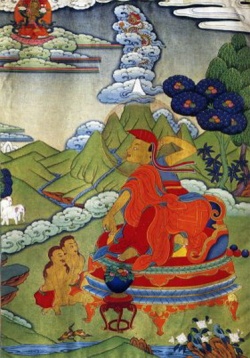Difference between revisions of "གནོད་སྦྱིན་"
Jump to navigation
Jump to search
(Created page with "{{DisplayImages|{{Random number}}}} {{Dictkey|གནོད་སྦྱིན།}} (Wyl. ''gnod sbyin '') {{Color|#808080|''Pron.:'' nöjin}} * ''Skt.'' {{SanskritB...") |
m (Text replacement - "{{Dictkey|" to "{{BigTibetan|") |
||
| Line 1: | Line 1: | ||
{{DisplayImages|{{Random number}}}} | {{DisplayImages|{{Random number}}}} | ||
| − | {{ | + | {{BigTibetan|[[གནོད་སྦྱིན]]།}} ([[Wyl.]] ''[[gnod sbyin]] '') {{Color|#808080|''Pron.:'' nöjin}} |
* ''Skt.'' {{SanskritBig|[[यक्षः]]}}, [[yakṣa]], {{Color|#006060|''Pron.:'' [[yaksha]]}}. From {{Color|#006060|''Sanskrit:''}} a living supernatural being, spiritual apparition, ghost, spirit | to some native •Comms. | N. of a class of semi-divine beings (attendants of [[Kubera]], exceptionally also of [[Vishṇu]] | described as sons of Pulastya, of Pulaha, of Kaśyapa, of Khasā or Krodhā | also as produced from the feet of Brahmā | though generally regarded as beings of a benevolent and inoffensive disposition, like the Yaksha in Kālidāsa's Megha-dūta, they are occasionally classed with Piśācas and other malignant spirits, and sometimes said to cause demoniacal possession | as to their position in the Buddhist system | a subdivision of the Vyantaras | N. of [[Kubera]] | of a Muni | of a son of Śvaphalka | of Indra's palace | a dog | * ''Skt.'' {{SanskritBig|[[यक्षः]]}}, [[yakṣa]], {{Color|#006060|''Pron.:'' [[yaksha]]}}. From {{Color|#006060|''Sanskrit:''}} a living supernatural being, spiritual apparition, ghost, spirit | to some native •Comms. | N. of a class of semi-divine beings (attendants of [[Kubera]], exceptionally also of [[Vishṇu]] | described as sons of Pulastya, of Pulaha, of Kaśyapa, of Khasā or Krodhā | also as produced from the feet of Brahmā | though generally regarded as beings of a benevolent and inoffensive disposition, like the Yaksha in Kālidāsa's Megha-dūta, they are occasionally classed with Piśācas and other malignant spirits, and sometimes said to cause demoniacal possession | as to their position in the Buddhist system | a subdivision of the Vyantaras | N. of [[Kubera]] | of a Muni | of a son of Śvaphalka | of Indra's palace | a dog | ||
{{RigpaWiki}} | {{RigpaWiki}} | ||
{{TibetanLetters}} | {{TibetanLetters}} | ||
Latest revision as of 06:03, 21 November 2015
གནོད་སྦྱིན། (Wyl. gnod sbyin ) Pron.: nöjin
- Skt. यक्षः, yakṣa, Pron.: yaksha. From Sanskrit: a living supernatural being, spiritual apparition, ghost, spirit | to some native •Comms. | N. of a class of semi-divine beings (attendants of Kubera, exceptionally also of Vishṇu | described as sons of Pulastya, of Pulaha, of Kaśyapa, of Khasā or Krodhā | also as produced from the feet of Brahmā | though generally regarded as beings of a benevolent and inoffensive disposition, like the Yaksha in Kālidāsa's Megha-dūta, they are occasionally classed with Piśācas and other malignant spirits, and sometimes said to cause demoniacal possession | as to their position in the Buddhist system | a subdivision of the Vyantaras | N. of Kubera | of a Muni | of a son of Śvaphalka | of Indra's palace | a dog
